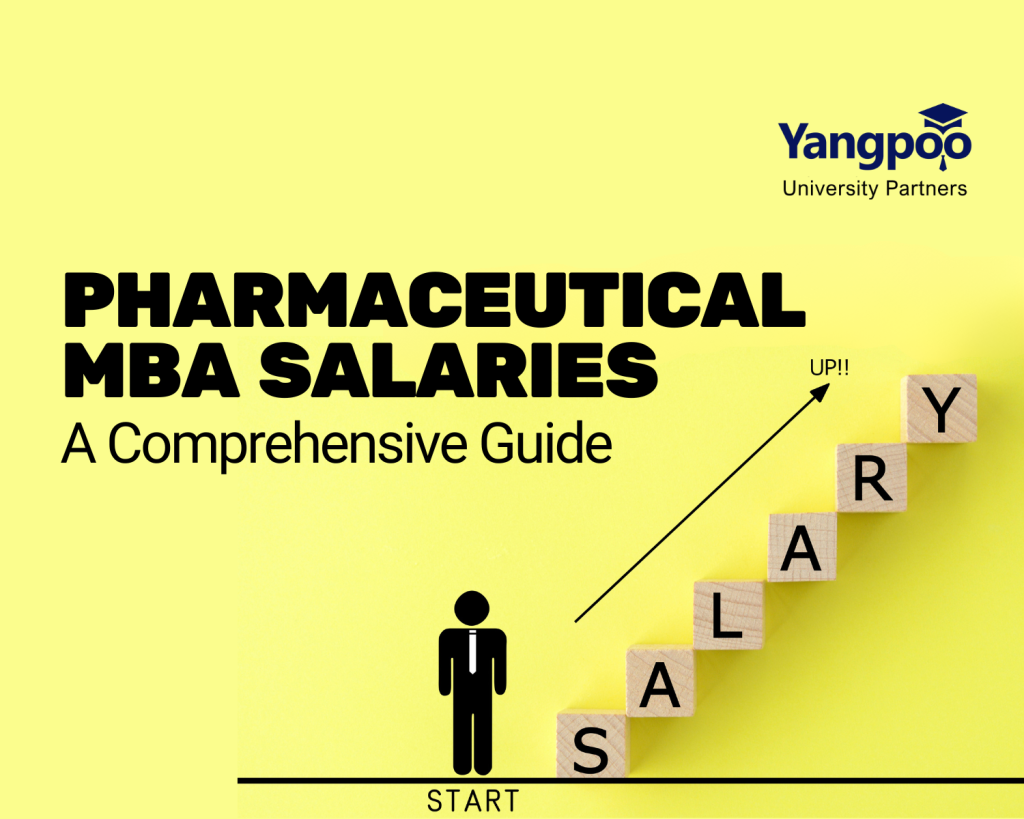In today’s healthcare landscape, the demand for professionals who can navigate the complexities of both business and pharmaceuticals has never been higher. With ongoing technological advancements, regulatory changes, and global health crises, the role of a professional with a Master of Business Administration (MBA) in Pharmaceutical Management is increasingly important. Graduates of this specialized MBA program possess a rare combination of business acumen and pharmaceutical expertise, enabling them to lead and innovate in a competitive market. Furthermore, the pharma MBA scope and salary have seen a significant increase due to these challenges, making it a highly attractive degree for ambitious professionals.
The salary after an MBA in pharmaceutical management has also witnessed a steady rise as companies prioritize skilled management to address healthcare needs and business operations. The integration of business strategy with pharmaceutical knowledge allows graduates to make impactful decisions, manage resources efficiently, and adapt to the dynamic nature of the healthcare sector.
Understanding MBA in Pharmaceutical Management
An MBA in Pharmaceutical Management is a specialized program that focuses on equipping students with knowledge and skills that blend pharmaceutical sciences with business management. Unlike traditional MBAs, this degree is tailored to the unique needs of the pharmaceutical sector, covering areas like regulatory affairs, drug distribution, marketing, and global healthcare systems. Students gain expertise in topics such as supply chain management, pharmaceutical marketing, and regulatory compliance, all while developing critical leadership and decision-making skills.
One of the program’s key attractions is the salary after MBA in pharmaceutical management, which reflects the high demand for individuals who understand both the science behind the products and the business strategies needed for market success. The pharmaceutical MBA salary has seen an upward trajectory as the industry’s need for skilled professionals continues to grow.
Why Choose an MBA in Pharmaceutical Management?
The significance of an MBA in Pharmaceutical Management lies in its ability to bridge the gap between pharmaceutical science and business operations. This program is crucial for those aspiring to lead pharmaceutical companies or healthcare organizations, as it combines industry-specific expertise with general management skills. Professionals with this degree can contribute significantly to the innovation, production, and distribution of pharmaceutical products, making the degree invaluable.
Additionally, the salary after an MBA in pharmaceutical management is highly competitive, making it an attractive option for professionals. With increasing mergers, acquisitions, and the globalization of healthcare, having a specialized degree enhances career prospects, and an MBA in pharmaceutical management salary per month often surpasses other MBA specializations.
Top Roles and Salaries in MBA Pharmaceutical Management – Entry Level, Mid Level & Senior Level
An MBA in Pharmaceutical Management helps the pharmaceutical industry by providing well-rounded professionals capable of handling various managerial roles. The degree prepares graduates to manage not only the day-to-day operations but also long-term strategic goals in product development, marketing, and compliance. Whether it’s optimizing supply chains, ensuring regulatory compliance, or driving pharmaceutical marketing initiatives, graduates bring a high level of expertise.
The pharma MBA scope and salary are reflective of how much the industry values these professionals. With the industry’s dynamic nature, skilled managers play a crucial role in ensuring profitability and growth, which translates into better mba pharmaceutical management salary per month for graduates.
Top Roles in Pharmaceutical Management with Salaries
| Role | Summary of Responsibilities | Estimated Salary (INR) |
|---|---|---|
| Medical Representative | Promote pharmaceutical products to healthcare providers | 4-6 lakhs/year |
| Regulatory Affairs Associate | Manage regulatory submissions and compliance | 3-5 lakhs/year |
| Clinical Research Associate | Assist in clinical trials and data management | 3-5 lakhs/year |
| Product Manager | Develop and manage product lifecycle strategies | 6-10 lakhs/year |
| Regulatory Affairs Manager | Oversee regulatory submissions and ensure compliance | 6-10 lakhs/year |
| Clinical Research Manager | Lead clinical trials and analyze data | 6-10 lakhs/year |
| Director of Regulatory Affairs | Lead regulatory strategies and ensure global compliance | 15-25 lakhs/year |
| Vice President of Pharmaceutical Operations | Manage overall pharmaceutical operations | 25-40 lakhs/year |
| Chief Medical Officer | Provide medical leadership and oversee product safety | 40-60 lakhs/year or more |
Factors affecting the changes in MBA Pharmaceutical Management salaries
Changes in the pharmaceutical industry, such as drug approvals, mergers, and acquisitions, and global economic conditions, can significantly impact pharmaceutical MBA salary. For instance, mergers and acquisitions often result in higher demand for skilled professionals, driving up salaries. Economic conditions like inflation can increase operational costs, but they can also lead to salary adjustments to retain talent. Moreover, new regulations and innovations in drug development create a scarcity of certain expertise, pushing up MBA pharmaceutical management’s salary for specialized roles.
Benefits of MBA in Pharmaceutical Management
An MBA in Pharmaceutical Management offers numerous advantages:
- Competitive Salary: The salary after an MBA in pharmaceutical management remains competitive, with a strong upward trend due to the industry’s growth.
- Industry Relevance: Graduates are equipped to handle roles that require both business and pharmaceutical knowledge, ensuring their relevance in the job market.
- Leadership Opportunities: The degree opens doors to senior roles in management, from product development to regulatory affairs.
- Global Demand: With the industry’s global expansion, the MBA pharmaceutical management salary per month has become competitive in international markets.
Popular MBA in Pharmaceutical Management Courses In India
MBA in Pharmaceutical Management graduates have a wide range of career options. They can work in sectors such as pharmaceutical companies, healthcare institutions, regulatory bodies, and even consultancy firms. Some of the most in-demand roles include:
- Product Manager
- Regulatory Affairs Manager
- Business Development Manager
- Pharmaceutical Sales Manager These roles offer competitive pharmaceutical MBA salary packages, reflecting the increasing demand for professionals who understand both business strategy and pharmaceutical science.
Top Colleges and Cost Analysis: MBA Pharmaceutical Management
Some of the top-ranked MBA in Pharmaceutical Management programs in India include:
- NMIMS (Mumbai): Known for its industry-aligned curriculum and strong alumni network. It provides hands-on experience and offers excellent placement opportunities.
- IIHMR University (Jaipur): Specializes in healthcare management, offering a program focused on pharmaceutical and healthcare industries.
- Chitkara University (Patiala): Known for its comprehensive curriculum and excellent industry connections, Chitkara is a popular choice among pharmaceutical MBA aspirants.
Each of these programs offers unique features such as specialized internships, exposure to industry leaders, and excellent placement records, with a high MBA in pharmaceutical management salary per month post-graduation.
Eligibility Criteria for MBA in Pharmaceutical Management
Bachelor’s degree with a minimum aggregate score of 50% (45% for reserved categories)
Curriculum for MBA in Pharmaceutical Management
- Pharma Sector & Management: Introduction to the pharmaceutical sector’s business environment and management practices.
- Managerial Accounting: Developing financial acumen necessary for managerial decision-making.
- Managerial Computing: Computer applications and software skills essential for management functions.
- Pharma Sector Business Environment: Understanding regulatory, economic, and social factors influencing the pharma industry.
- Probability and Statistics: Quantitative analysis techniques used in business decision-making.
- Managerial Economics: Economic principles and their application to pharmaceutical management.
- Managerial Communication: Enhancing communication skills for managerial roles.
- Pharmaceutical Marketing Management: Focused on marketing strategies in the pharmaceutical sector.
- Operations Management: Study of operational processes and supply chain management in pharma.
- Field Posting and Seminar: Practical exposure and research through field postings and seminars.
Explore MBA Degrees from Top Universities at Yangpoo
| University | Program Name | Duration | ||
| Welingkar Institute of Management | Post Graduate Program in Media & Entertainment | 11 Months | ||
| Welingkar Institute of Management | Post Graduate Program in Entrepreneurship and Family-managed Business | 11 Months | ||
| Welingkar Institute of Management | Hybrid Post Graduate Diploma in Management | 2 years | ||
| Deakin University GIFT City Campus, India | Masters in Business Analytics | 2 years (fast-tracked to 18 months) | ||
| DY Patil University | Masters of Business Administration |
Ready to take the next step in your career? Visit our website today yangpoo.com to learn more about these top MBA programs and how they can help you achieve your professional goals.
Conclusion
An MBA in Pharmaceutical Management provides a strategic blend of business and pharmaceutical expertise, preparing graduates for leadership roles in the dynamic healthcare sector. The curriculum covers managerial and industry-specific topics, offering practical experience and access to high-demand roles, ensuring strong career growth and competitive salaries, alongside numerous jobs for MBA graduates in this thriving industry.
FAQs
What is the salary package after an MBA in pharmaceutical management?
The salary for an MBA in Pharmaceutical Management can vary from ₹3-5 lakhs to ₹15-20 lakhs per annum, depending on factors like experience, role, and location. Popular roles include product manager, market research analyst, and regulatory affairs manager.
What is the scope of an MBA in pharmaceutical management?
The scope of an MBA in Pharmaceutical Management is vast and encompasses various roles within the pharmaceutical industry, including product management, market research, regulatory affairs, healthcare consulting, and business development.
Which MBA is best for pharma?
The MBA in Pharmaceutical Management is the best option for those seeking to excel in the pharma sector. It offers specialized knowledge in areas like pharmaceutical marketing, regulatory affairs, and drug development, preparing graduates for leadership roles in pharmaceutical companies.
Who is eligible for a pharma MBA?
Eligibility for an MBA in Pharmaceutical Management typically requires a bachelor’s degree in any field, preferably related to science, pharmacy, or business.
What is the difference between a pharma MBA and a normal MBA?
A normal MBA provides a broad-based business education, while a Pharma MBA offers a specialized focus on the pharmaceutical industry. This specialization equips graduates with the specific knowledge and skills required to succeed in the pharmaceutical sector.
Which is better: an MPharm or an MBA in pharmaceutical management?
The choice between an MPharm and an MBA in Pharmaceutical Management depends on your career goals and interests. MPharm focuses on scientific aspects, while MBA focuses on business aspects. Consider your career goals, interests, skills, and personal preferences to make the best decision.
Which entrance exam is best for a pharma MBA?
Some commonly accepted entrance exams for MBA in Pharmaceutical Management include CAT, GMAT, MAT, and XAT. However, specific requirements may vary between universities and programs. It’s recommended to check the admission requirements of your target institutions to determine the most suitable entrance exam.





